Positions & Papers
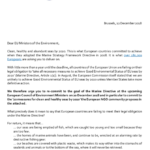
20 measures for 2020
December 15, 2018
Seas at Risk, an umbrella organisation of environmental NGOs across Europe, have written a letter to Environment Ministers proposing 20 measures that are needed to implement the EU's environmental obligations, supported by 35 organisations. "Clean, healthy and abundant seas by 2020. This is what European countries committed to achieve when they adopted the Marine Strategy Framework Directive in 2008. With little more than a year until the deadline, all countries of the European Union are failing on their legal obligation to ‘take all necessary measures to achieve Good Environmental Status of EU seas by 2020’ (Marine Directive, Article 1(1)). In August, the European Commission itself stated that we are unlikely to achieve Good Environmental Status of EU seas by 2020 unless Member States take more definitive action." These 20 measures would stop the degradation of our seas and prevent serious impacts to nature and society. The are using the hashtag #OurBlueLung to highlight the issue because our seas and ocean produce over half of the oxygen we breathe.
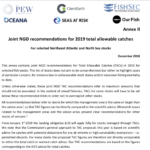
EU Fisheries Council 17-18 December. North Sea and Atlantic quotas – Joint NGO position
December 7, 2018
In our joint letter, policy annex and TAC recommendation annex The Fisheries Secretariat along with The Pew Charitable Trusts, Seas At Risk, Oceana, ClientEarth, and Our Fish have agreed joint recommendations ahead of the December Council at which TACs will be set for over 100 stocks in the North Sea and Northeast Atlantic.
The MSY obligation, all stocks managed with a sustainable fishing mortality in order to achieve biomass of Bmsy by 2020, is under serious threat of not being met. This is the penultimate Council meeting at which quotas will be set before the deadline. We also make recommendations regarding TAC rollovers for 'statement stocks', as well as recommendations for stocks without a TAC. In addition, we cover setting TACs in the context of the landing obligation and improving the transparency and accountability of setting fishing limits. The Fisheries Council will conclude on 18 December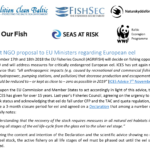
Joint NGO proposal to EU Ministers regarding European eel
December 7, 2018
In a proposal to Ministers ahead of the December Council meeting several organisations have called for the full implementation of the ICES advice for the critically endangered European eel and suggested improvements regarding the fishery closure periods that were implemented last year.
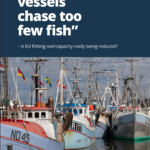
Too many vessels chase too few fish – report on overcapacity in the EU
December 4, 2018
A new report from the Fisheries Secretariat shows that EU rules regarding fishing capacity are not being followed in the Baltic region. Member States have fudged their figures, obscuring which fleet segments and vessels fish on which stocks and the European Commission has not revised its guidelines in order to ensure clarity, as recommended by its own advisory committee. There is clear evidence that overcapacity has been used to influence quota negotiations at the EU Council, however, despite EU subsidy funding being based on there being no overcapacity the Commission has not taken action to follow through. Article 22 of the EU Common Fisheries Policy requires Member States to adjust the fishing capacity of its fleet to the available fishing opportunities. Overcapacity should be identified and addressed, in order to achieve a better balance with the harvested stocks, avoid overfishing, reduce incentives for discarding and other illegal practices, and avoid the socioeconomic problems caused by too many vessels competing over limited quotas. However, the system put in place to address overcapacity in 2013 fails at just about every step, according to the report. You can read our news story on the report here We have also produced national summaries for Denmark, Germany and Poland.
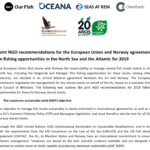
Joint NGO recommendations for EU-Norway agreement on fishing opportunities in 2019
November 19, 2018
In the briefing and annex joint recommendations have been produced ahead of the annual agreement between the EU and Norway concerning fishing opportunities for shared stocks. Fully implementing maximum sustainable yield management, as well as the landing obligation and ensuring greater transparency are among the recommendations, along with detailed TAC recommendations provided in the annex. Details from the 2018 negotiation can be found here.
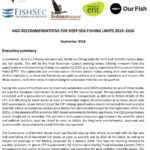
Council briefing on Deep Sea TACs – joint NGO paper
November 9, 2018
In the letter and policy annex sent to Ministers and Member States ahead of the November Council and which deep sea TACs for 2019 and 2020 were set NGOs called for the EU to fully implement its policy of ending overfishing. This was the first time fishing opportunities were set after the 2020 deadline. A series of policy recommendations for both the most vulnerable stocks and also improvements to data collection, monitoring and transparency were made.
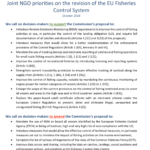
Joint NGO priorities on the revision of the EU Fisheries Control System
October 30, 2018
A broad coalition of NGOs have together drawn up a series of recommendations based on the EU Commission proposal for the revision of the Fisheries Control System, this includes both an analysis of the proposal as well as a detailed 12 point plan for reform. In November 2019 our Joint NGO priorities have been updated.
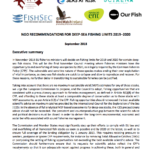
Joint NGO position on Deep Sea TACs and quotas in 2019 and 2020
September 11, 2018
This briefing provides joint recommendations from ten organisations on Deep Sea fishing opportunities in 2019 & 2020. These TACs will be decided at the November Council and are the first TACs to be set after the EU Maximum Sustainable Yield deadline has passed.
The Fisheries Council will conclude negotiations on the TACs on 19-20 November.
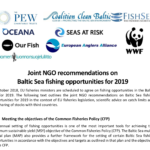
Joint NGO position on Baltic TACs and quotas in 2019
August 1, 2018
This briefing provides joint recommendations from nine organisations on fishing opportunities in the Baltic for 2019. We highlight the priorities of full implementation of the maxiumum sustainable yield objective and the landing obligation, urging Ministers to set quotas not exceeding scientific recommendations.
The Fisheries Council will conclude negotiations on the TACs on 15-16 October in Brussels and the regional management forum, BALTFISH, will conduct preparatory work.
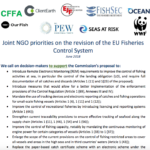
EU Fisheries Control System revision – joint NGO priorities
June 26, 2018
The Commission proposal for a revision of the 2010 EU fisheries Control Regulation has been published and a coalition of NGOs have outlined our priorities here. These include ensuring full compliance with the landing obligation, achieving coherence with Technical Measures, improving enforcement and sanctions, making better use of technology to improve the accuracy of reporting and allow for better data, improving traceability, as well as ensuring MPAs are guaranteed effective protection.